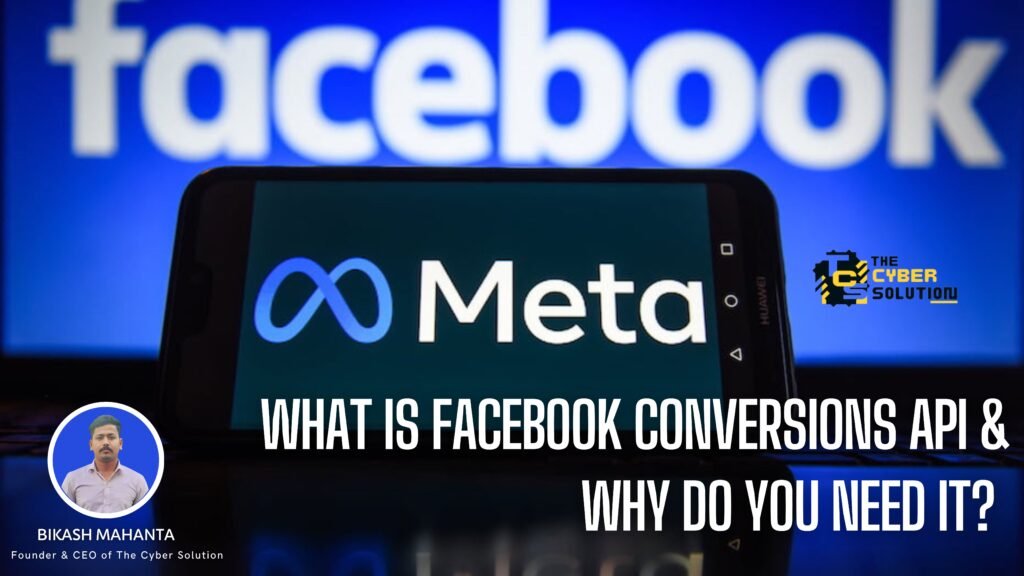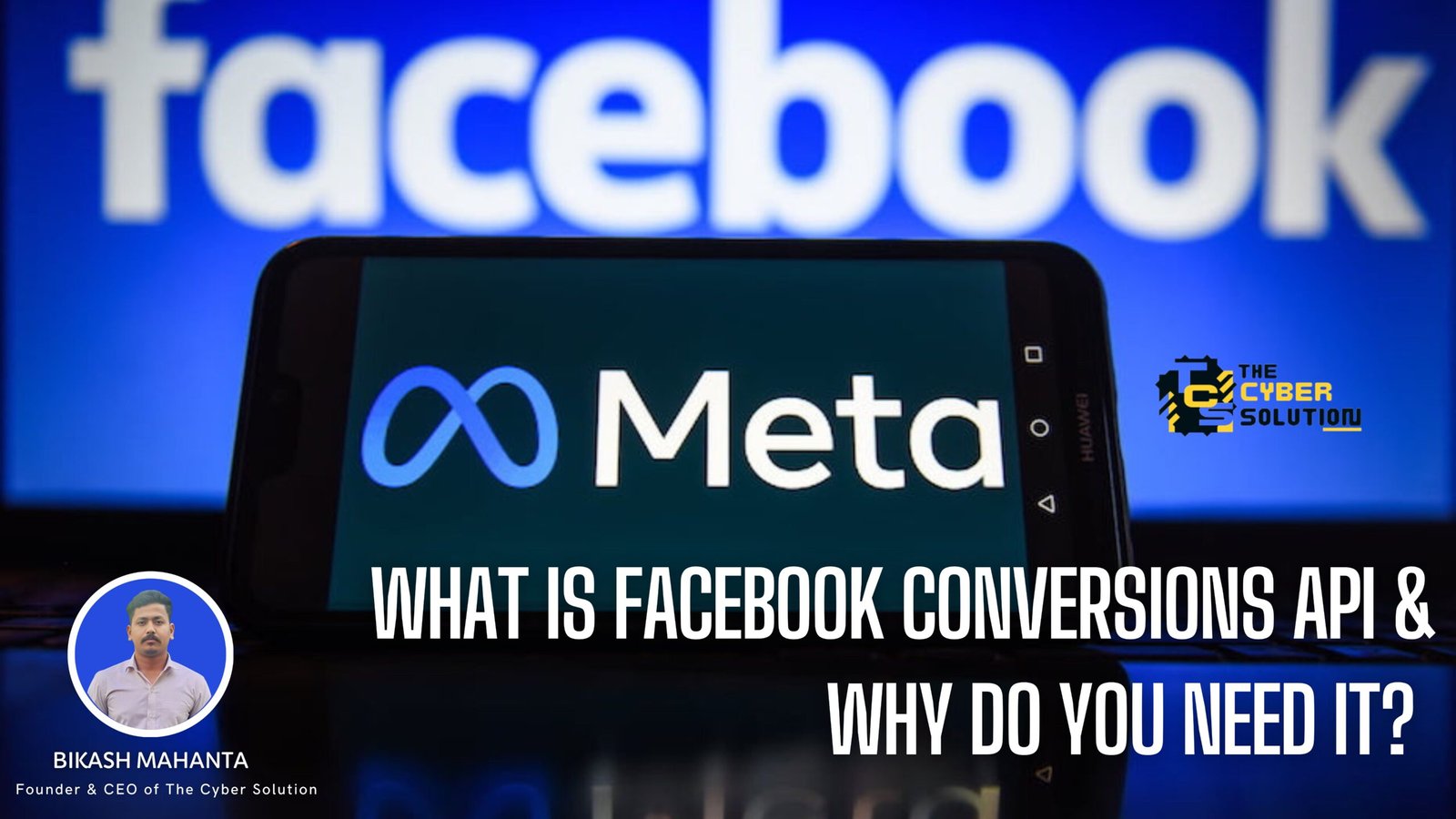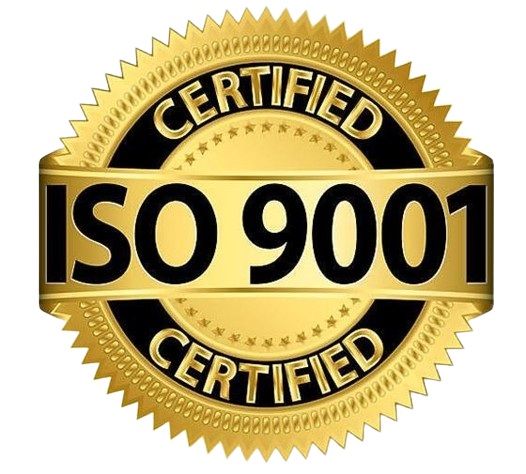WHAT IS FACEBOOK CONVERSIONS API?
An API, or Application Programming Interface, serves as a cornerstone in the realm of digital technology. It acts as a conduit, facilitating the seamless exchange of information between different software applications. A prime example of such an API is the Facebook Conversions API (CAPI), a software tool with a specific purpose: tracking consumer actions that extend beyond the confines of the web. For advertisers on the Facebook platform, CAPI stands as an indispensable asset.
However, if you find yourself unfamiliar with this solution and uncertain about how to utilize it effectively, fret not. Meta, the parent company of Facebook, has thoughtfully selected a handful of agencies to join forces with, providing a straightforward pathway for CAPI adoption. Among these chosen partners is Ignite Visibility, poised and prepared to assist you in configuring the Conversions API. With our guidance, you can establish a direct link between the marketing data you collect and the Meta platform.
The primary aim of harnessing the Facebook Conversions API is to empower advertisers to harness the potential of first-party data while navigating the challenges that have emerged in recent times. Advertisers have encountered significant constraints on the use of third-party data, primarily due to the enhanced emphasis on privacy by industry giants like Apple and Google. CAPI, however, offers a workaround to these privacy hurdles.
In particular, companies such as Apple and Google have made user privacy a paramount concern, implementing measures such as iOS updates that restrict access to third-party data for advertisers. The Conversions API, utilizing first-party data, presents a strategic solution to bypass these privacy roadblocks. This innovative approach not only enables advertisers to fine-tune their ad targeting and reduce the cost per action but also provides a more comprehensive perspective on their results—all the while safeguarding user privacy.
To sum it up, the Facebook Conversions API emerges as an essential tool for advertisers looking to navigate the evolving landscape of digital advertising. It empowers them to leverage first-party data, address privacy challenges posed by tech giants, and optimize their ad campaigns on the Facebook platform. Ignite Visibility and other handpicked agencies are here to guide advertisers through the setup process, ensuring that they can make the most of this valuable resource.
Facebook Conversions API vs. Facebook Pixel Alone

Before the introduction of the Facebook Conversions API (CAPI), advertisers primarily relied on Facebook Pixel to collect user data and track the performance of their campaigns. However, the landscape changed significantly with Apple’s iOS 14 update, which placed a higher emphasis on user privacy. Suddenly, advertisers found themselves in need of more than just Pixel to effectively manage their campaigns.
This is where the Facebook Conversions API steps in, working in tandem with Facebook Pixel, which has been rebranded as Meta Pixel. Together, they offer a powerful solution to maximize the potential of your data. While Pixel focuses on tracking the customer journey and interactions, the Conversions API provides insights into the ultimate results of your marketing efforts.
The Conversions API plays a crucial role in enhancing the transparency of the buyer’s journey by measuring customer actions that Pixel captures. It allows you to gain a clearer understanding of how user interactions translate into tangible results. Moreover, CAPI provides you with the flexibility to choose which data to share with Facebook Ads Manager and precisely when you want to share it, ensuring you have full control over your data sharing process.
By combining Facebook CAPI and Pixel, you gain a comprehensive understanding of your campaign’s performance, enabling you to optimize it effectively. In fact, according to a study conducted by Meta, the integration of these two tools can lead to a remarkable reduction in the cost per result, potentially slashing it by as much as 13%. Advertisers who leverage both Facebook Conversion API and Pixel also tend to experience an average increase of 19% in attributed purchase events, which is a testament to the enhanced capabilities of this dynamic duo.
KEY BENEFITS: WHY USE CAPI?
The Facebook conversion API offers multiple advantages that make it worth implementing for your ad campaigns.
Here are some of the more specific benefits of using Facebook CAPI:
Harness the Power of First-Party Data
The digital landscape has witnessed a significant shift in recent times, driven by the release of iOS 14 and the proactive privacy measures taken by tech giants like Apple and Google. One of the notable changes is the gradual phase-out of third-party data in a bid to enhance user privacy. Google, for instance, has officially announced its plans to eliminate third-party cookies entirely by the first quarter of 2024, underscoring the industry’s commitment to bolstering user data protection.
Amidst this evolving privacy landscape, the Facebook Conversions API (CAPI) emerges as a valuable ally for advertisers. CAPI is designed to establish a more direct connection between customer interactions and Facebook Ads Manager, enabling advertisers to leverage precious user data and, in turn, fine-tune their ad campaigns for better results.
When users engage with your brand through your website or other touchpoints like lead ads or customer relationship management (CRM) systems, this data becomes a valuable resource that can be harnessed to your advantage. CAPI plays a pivotal role in bridging the gap between these interactions and your advertising strategy, offering a seamless way to utilize this user data effectively.
In a world where user privacy and data protection are paramount, CAPI equips advertisers with the tools they need to connect customer interactions to their advertising efforts, ultimately enabling more targeted and optimized ad campaigns. This shift towards harnessing first-party data marks a critical transition in the advertising landscape, and CAPI stands at the forefront of this transformation, facilitating a more user-centric and privacy-conscious approach to digital advertising.
Protects Users’ Privacy
Facebook CAPI empowers you to gather crucial user data, enhancing your ad targeting and personalization capabilities. All the while, it prioritizes user privacy. By collecting first-party data through direct interactions, CAPI eliminates the reliance on third-party data, making it a valuable complement to, or even replacement for, Facebook Pixel.
Boosts Overall Ad Performance
Achieving deeper insights into customer actions and their journey is the key to unlocking the full potential of your ads. By seamlessly integrating Facebook Conversion API, you supercharge Meta Pixel, gaining comprehensive visibility into how individuals engage with your brand. Embracing CAPI is a forward-looking step in future-proofing your marketing strategy, ensuring it remains agile and effective in the evolving digital landscape.
WHY MARKETERS SHOULD REALLY CARE
Marketers are keen on harnessing the power of CAPI to optimize their campaigns, aiming for the lowest cost per acquisition (CPA) and reduced expenses.
The Facebook Conversions API empowers marketers with enhanced control over data sharing and collection. This newfound control enables marketers to paint a comprehensive picture of the customer journey, leading to more effective campaigns.
Additionally, CAPI equips marketers with the ability to send Meta the right signals for precise ad targeting, minimizing the risk of false positives or negatives that could otherwise hamper their efforts.
Notably, as the era of third-party cookies draws to a close, CAPI becomes indispensable. It allows marketers to leverage first-party data effectively, compensating for the loss of third-party data and ensuring their advertising efforts remain successful in the changing digital landscape.
HOW TO SET UP FACEBOOK CONVERSIONS API
To set up CAPI for data sharing, take the following basic steps:
Step 1: Set Up Your Meta Business Suite Account
To get started, your first step is to establish a Meta Business Suite account. This business account provides access to essential tools like Facebook Pixel and Ads Manager. With both of these in your toolkit, you can effectively measure and track customer actions, setting the foundation for a successful digital advertising strategy.

Step 2: Create a Meta Pixel
To get started, your first step is to establish a Meta Business Suite account. This business account provides access to essential tools like Facebook Pixel and Ads Manager. With both of these in your toolkit, you can effectively measure and track customer actions, setting the foundation for a successful digital advertising strategy.
Step 3: Install a Meta Pixel on Shopify and/or WooCommerce
For Shopify or WooCommerce store owners, integrating the Meta Pixel is crucial for tracking and optimizing your e-commerce efforts.
To set up the Meta Pixel on your Shopify store:
- dashboard and navigate to the “Online Store” web section.
- Click on “Preferences” and add the Meta Pixel to your Shopify site.
If you’re using WooCommerce, follow these steps:
- Search for and install the “Facebook for WooCommerce” plugin in your WordPress dashboard and activate it.
- Configure the plugin by connecting it to your Facebook Business account, thereby linking it to your Meta Pixel and other essential features.
- Adjust the plugin settings to align with your preferences and insert the pixel ID you generated into the “Facebook Pixel ID” box.
- Access the “Conversion API” section within the plugin settings, enable it, and fine-tune any additional settings as needed.
By successfully integrating the Meta Pixel on your Shopify or WooCommerce platforms, you gain the ability to effectively track and leverage user data for enhanced e-commerce performance.
Step 4: Test the Pixel
Once you’ve installed the Meta Pixel on your Shopify or WooCommerce store, it’s essential to ensure it’s functioning correctly. The Meta Pixel Helper tool provides you with the means to test your individual pixel, verifying that it’s accurately tracking and capturing the data you need for your e-commerce operations.
Step 5: Set Up Facebook Conversion API
Now, it’s time to configure your Facebook Conversions API. The process begins by accessing your Facebook Business account and navigating to the Ads Manager section. There, you’ll find the Conversions API tab, where you can choose the appropriate configuration settings for your website, ensuring that it seamlessly integrates with your digital advertising strategy.
Step 6: Set Up Events in CAPI
The final step in the process involves setting up events using the Conversions API, and you can do so by following these steps:
- Create a specific event to track with the Conversions API, such as signups, purchases, app installs, and more.
- Utilize your Meta Pixel ID when configuring the event.
- Complete the event setup within Facebook Events Manager. Choose the relevant pixel and provide specific event details.
- Integrate the event code into your designated website or mobile app. When users complete the event, the data will be transmitted directly to Ads Manager.
- Verify the event’s functionality by personally completing it and checking if the data flows to Facebook Ads Manager.
- Begin tracking your event to collect and analyze data, enabling you to make informed decisions for optimizing performance and enhancing your digital advertising strategy
SUCCESSFUL EXAMPLES OF CAPI
Curious about the potential success of the Conversions API? Take inspiration from these success stories that highlight the impressive results it can deliver:
Full Harbor Clothing
Beachwear brand Full Harbor Clothing saw a 43% increase in purchase conversion rate within two weeks after integrating CAPI.

BoxyCharm
This U.S. beauty subscription box benefited from a 23% increase in retention rate over four months after integrating CAPI.
Also, BoxyCharm saw a 30% increase in return on ad spend (ROAS).

Shopify
Ecommerce giant Shopify also enjoyed success with the Facebook Conversions API in the form of a 16% boost in customer acquisition.
At the same time, the company measured a 14% decrease in customer acquisition costs.

FACEBOOK CONVERSIONS API FAQ
If you have questions that go beyond the basics of “What is the Conversions API?” Here are some frequently asked questions and answers to provide further clarity and assistance:
1. Why should I use the Conversions API and Meta Pixel together?
By combining the Facebook Conversion API with the Meta Pixel, you can significantly enhance your ad targeting and achieve superior results. This dynamic duo also empowers you to measure and optimize your ad campaigns with greater precision. Even if you already have a Meta Pixel in place, seamlessly integrating the Conversions API is a smart move to unlock its full potential.
2. Does the Conversions API negatively affect tracking or websites?
Integrating Facebook CAPI with your website or app won’t adversely impact your data or setup. In fact, it won’t cause any negative effects unless you choose to remove your Meta Pixel, which is a distinct component of your digital marketing infrastructure.
3. What types of events can you track with the Conversions API?
With your Conversions API setup, you can measure and track three key event types: Website events, app events, and offline conversions.
For example,
Actions like app downloads and website sign-ups transmit data directly to Facebook Ads Manager for seamless tracking. These events align with the ones you already monitor through a Meta Pixel, ensuring consistency and comprehensive insights across your digital landscape.
4. How can I optimize my CAPI setup?
Enhancing your Conversions API setup is achievable through several strategies, such as:
- Sharing a comprehensive set of relevant parameters to maximize event match quality.
- Sharing the same events through a website-plus-server connection for a seamless data flow.
- Preventing duplicate events from skewing your data.
- Ensuring events are shared in real-time or near-real-time, ensuring up-to-the-minute insights and optimization.
5. What are the best parameters to share with the Facebook Conversion API?
Enhancing event matching with accounts becomes more effective when you share a broader range of events along with detailed customer information parameters.
These parameters may encompass client IP addresses, hashed emails, or phone numbers. The choice of parameters to prioritize ultimately depends on the specific audiences you aim to track, ensuring a tailored and efficient tracking approach.
6. What is event match quality?
A crucial metric to keep in mind is event match quality, which evaluates how effectively the parameters you share for each event can link the event with specific accounts. A higher event match quality directly translates to an improved ability to target the right audience at the right moment with your ads. Additionally, it enhances the attribution of your events, enabling you to pinpoint which ads deliver the best results for your campaigns.
GET THE MOST FROM CAPI WITH IGNITE VISIBILITY
Looking to leverage the power of CAPI for your marketing efforts? You’re in luck! Meta has carefully selected a handful of agencies, Ignite Visibility among them, to offer a streamlined solution for setting up this new version of CAPI.
When you turn to us for assistance with the Conversions API, you’ll experience the simplest and most user-friendly way to utilize the platform. Plus, there are other advantages, including:
- Swift CAPI integration, reducing the process from weeks to mere minutes.
- No additional cost when our team manages Meta advertising, with some exceptions based on volume.
- Technical simplicity; just create your Ignite Visibility subdomain, and we’ll handle the rest.
- Complimentary maintenance, featuring automatic gateway updates with new features.
Besides CAPI expertise, we offer a range of other digital marketing services, including social media marketing, to help you achieve the best results from your advertising and marketing campaigns.
Ready to get started?
Reach out to us and commence the seamless integration of CAPI today!




